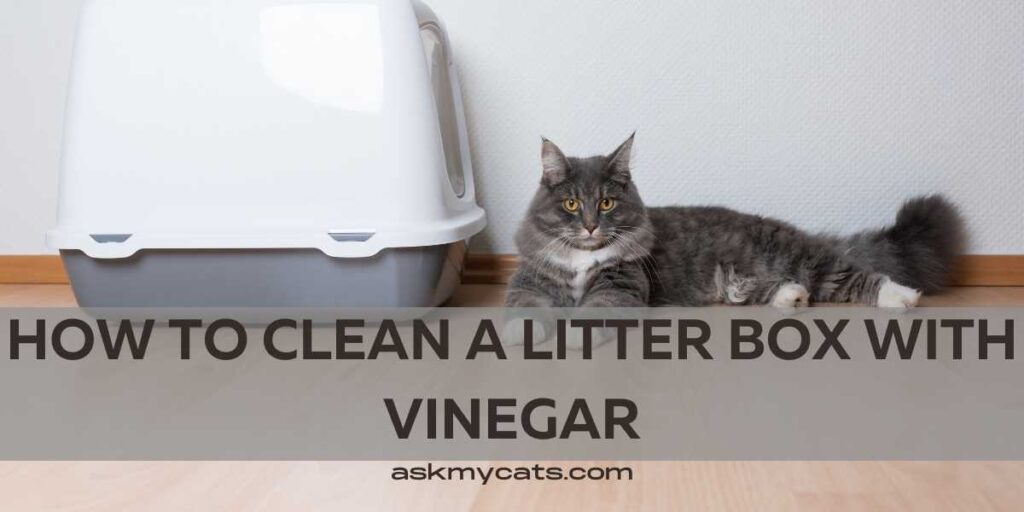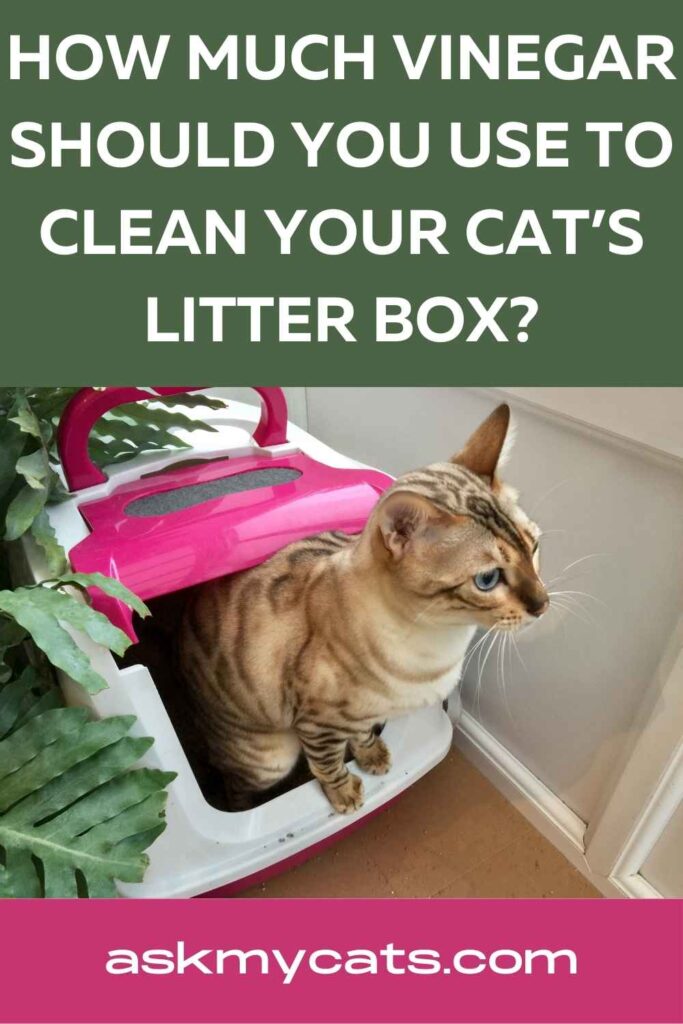When we think of cleaning the litter box of our cats, we instantly think of expensive chemicals and cleaners available on the market. In fact, millennial cat parents like me must have also been guilty of being charmed by the inexpensive and easy-to-use “multi-purpose cleaners” that are often on sale in the neighborhood markets and stores.
But did you know that there is a household item, most probably available right now in your own fridge, that could work as a great cleaner? I am not kidding. That household item is none other than the good old vinegar!
I am sure this must have hit you as a pleasant surprise – but it is indeed true. Of the many types of kinds of vinegar available, there are certain types that act as really good cleaners for the litter boxes of your cats.
Curious to know more about the “how”, “what”, and “when” about using vinegar as a cleaner? Read along as we navigate the uses, steps to follow, advantages, and disadvantages, as well as some handy extra tips.


Give Your Cat the Perfect Day
Get the Free Ebook!
Can You Use Vinegar To Clean A Litter Box?

Like any other average millennial, you must surely have a bottle of vinegar sitting in one of your kitchen cabinets right now. It is after all a common household item.
But like most people who store bottles of vinegar, even you must have only taken it out to either make a salad dressing, or as a marinade for veggies, poultry, meat, or fish.
What we often don’t realize is that vinegar is one of the best natural cleaners available. It can be used to create a natural, eco-friendly, and non-toxic cleaning solution.
Vinegar is indeed a wonder ingredient. From descaling coffee makers to remove the rust and grime that stains smaller appliances, vinegar can be your one-stop solution for most of your cleaning needs.
And yes, this also includes the litter box of your cats!
Does Vinegar Really Work As A Cleaner?
So now we know that vinegar can be used as a cleaner for the stinky litter box in the house. But what makes vinegar such a good cleaning agent? To answer that question, we will have to revisit some of our high school chemistry classes.
What is vinegar, chemically? From a chemical point of view, vinegar is made up of something called acetic acid. Acetic acid is the major component in all types of vinegar. That’s what gives vinegar its acidity, which consequently gives it a pungent smell and a sharp sour taste.
To dive a little deeper into chemistry, we can quantify the acidity of the vinegar. To be precise, vinegar has a pH value of 2.4 – which means it is very, very acidic. This intense acidity is what gives vinegar its really good cleaning properties.
Because of the highly acidic nature of vinegar, it helps in counteracting icky buildups from most surfaces and materials. If your tap has running hard water, then vinegar can also help remove those ugly brine stains of hard water from surfaces.
And if that is not convincing enough, here’s another argument in favor of vinegar’s cleaning capabilities: vinegar can be used to make a paste with baking soda, which can even remove the stains and the stinky odor of your cat’s urine from your favorite carpets!
Of All The Available Types, Which Is The Best Type Of Vinegar For Cleaning A Litter Box?
If you’re a foodie or have a good hold of the inventory of the kitchen, you’ll be familiar with the numerous types of vinegar that are available in the market today. There is a huge list of choices available. But as goes the saying – with great choices comes great confusion.
The different types of vinegar include apple cider vinegar, white distilled vinegar, balsamic vinegar, red wine vinegar, and white wine vinegar.
Of all these available options, the best vinegar for cleaning your cat’s litter box is the white distilled vinegar because it is the most acidic in nature compared to the other types. Moreover, it does not have any coloring agent – so it does not leave any stains on the surfaces.
When Should You Absolutely Not Use Vinegar?
While vinegar happens to be this wonder cleaning agent, it is not all smooth and good. You need to be cautious when using vinegar on certain surfaces and fabrics as vinegar’s highly acidic nature can cause irreparable damage.
If your cat urinates on light, soft fabrics, or on surfaces made of graphite or marble, do not use vinegar as it leaves stains on such surfaces.
Another time when you should not use vinegar is when you are already using an ammonia-based cleaner for the cat’s litter box. Ammonia and vinegar tend to neutralize each other, so they will not form a good cleaning solution.
However, if you have used an ammonia-based cleaner, and now want to get rid of the residual smell of vinegar from the litter box, you can add a few drops of vinegar to the litter box. The neutralizing reaction of vinegar and ammonia eliminates any residual odors of both ingredients.
Check out more details about Does Vinegar Keep Cats Away?
How Can You Clean Your Cat’s Litter Box With Vinegar?

We have discussed a lot about the cleaning nature of vinegar, its different types, and the best kind to use for cleaning. Let us now look at how we can use white distilled vinegar to clean the litter box of the cats.
Steps To Follow When Using Vinegar To Clean A Cat’s Litter Box
Step 1 – Collect all the tools that you will be needing for the entire cleaning process.
The litter box is going to be one messy, stinky thing to clean. So, you will be needing a fair share of tools and gears. Some of the most basic tools that you will be needing are:
- Durable thick gloves
- Protective eyewear because vinegar can give out acidic fumes sometimes
- A protective medical mask to avoid breathing in dust and ammonia from cat urine
- Scrubbing brush and detergent
- Baking soda
- And of course, vinegar – either white distilled vinegar or apple cider vinegar is best for cleaning the litter box
Step 2 – Empty the litter box entirely and scrape off any excess or stuck clumps of sand and litter
This is the step where you need to first scoop out the cat’s feces from the litter box if you have not already done so. If you have already done that, then empty the sand from the litter box into a garbage bag.
Remember to be cautious during this step because if you shake the litter box too hard, it may cause excess dust from the sand to spread in the air around you. And it can be harmful to inhale the dust as it may even contain ammonia particles from the cat’s urine or feces.
In this step, ensure that you remove all the litter clumps and sand particles. Scrape out the clumps that may have gotten stuck to the base of the litter box.
Step 3 – Rinse the litter box with hot boiling water and use a detergent to disinfect
Once you have cleared all the sand from the litter box and completely emptied it out, the next step is to rinse the litter box with hot boiling water. Pour a good disinfectant detergent to clean the litter box.
It is important to use a disinfectant detergent because while white vinegar is a very good cleaner, it has not been proven to show disinfecting properties.
White vinegar and apple cider vinegar can clean the litter box but cannot kill harmful germs like salmonella which may be present on the surface due to feces and urination.
Step 4 – Use the master ingredient, i.e., a few drops of white distilled vinegar or apple cider vinegar
After rinsing and cleaning the litter box, now is when you should add a few drops of either white distilled vinegar or apple cider vinegar, and scrub thoroughly with a scrubbing brush. After applying and scrubbing the litter box with vinegar, make sure you rinse it very thoroughly.
Use paper towels to soak excess water off the surface and pat the litter box dry. After drying the litter box, put it out in the sun to dry completely for a few hours. This helps in removing the smell of the vinegar.
Step 5 – This is an optional step, but you could consider putting deodorizer in the litter box
There is a wide variety of options available to use as a deodorizer for the cat’s litter box. One of the cheapest options available is baking soda.
You can sprinkle a little bit of baking soda on the surface of the litter box. It will cover up the bad smell for quite a substantial time.
Do not worry if you have run out of baking soda; there are several household alternatives available too. Some of these can be green tea and charcoal briquettes.
Do not use aromatic deodorizers, as the cats may not like heavily scented substances and may avoid using the litter box.
After adding the deodorizer of your choice, the last thing to do is to fill it up with a new bag of fresh litter sand and your litter box will be ready for your cats to use!
Extra Handy Tips
While the five steps mentioned above are the general steps to be followed, and they are pretty sufficient as well, there are two more bonus tips for you to get that extra clean, extra fresh litter box when using white distilled vinegar as your cleaning solution.
Bonus Tip 1 – Use Carbonated Water With White Distilled Vinegar For A Natural Antibacterial Cleaning Solution
Isn’t it great how all these household items, that we have stored in our kitchen cabinets forever, are now coming in handy for cleaning our cats’ litter boxes?
Other than vinegar, yet another item that is commonly found in households is a bottle of carbonated water. It surely does go well with your favorite packet of chips and nachos – but that is not all when it comes to the goodness of carbonated or sparkling water.
This fizzy beverage has antibacterial properties, and when you mix it with a few drops of white distilled vinegar or even apple cider vinegar, you can get your very own natural and non-toxic antibacterial cleaning solution for your cat’s litter box!
In fact, carbonated water creates a stronger and more effective cleaning solution than warm water with vinegar.
Bonus Tip 2 – Use Lemon Juice In A Mix Of Carbonated Water And Vinegar To Get A Fresh Smelling Cleaning Solution
You can use lemon juice in one of two ways:
- If you have carbonated water available at home, you can create a mix of all three ingredients: lemon juice, vinegar, and carbonated water. This will give you a cleaning solution that not only has antibacterial purposes but also smells fresh and covers up the smell of any residual stink of the litter box.
- If, however, you do not have carbonated water available at home, you can simply add lemon juice to a mixture of warm water and vinegar to get a fresh citrus cleaning solution.
One thing to keep in mind when adding lemon juice to vinegar is that both lemon and vinegar are acidic. So, after cleaning the litter box you may want to keep it outside in the sun to dry completely and properly.
Cats often do not like strong sour, and acidic smells. So, ensure that the litter box is completely dried in the sun and with a dry paper towel before you add a new bag of fresh litter sand into the litter box.
How Much Vinegar Should You Use To Clean Your Cat’s Litter Box?

It is very important to note that you should only use a diluted solution of vinegar to make your cleaning agent. Just add a few drops of white distilled vinegar or apple cider vinegar to a mug of warm water or carbonated water to create a strong cleaner.
Vinegar is majorly constituted of a compound called acetic acid, which makes vinegar highly acidic in nature – so much so, that to put it quantitatively, vinegar has a pH of 2.4.
Using such a concentrated acid in an undiluted way on the litter box will leave behind a very strong and pungent smell that will take at least 24 to 48 hours to completely go off from the surface.
This will not be an ideal situation as cats are often repulsed by very strong sour and pungent acidic smells. So, if your kitty smells the vinegar in its litter box, it may not choose to use it until the smell wears off completely, or at least becomes milder.
But What Should You Do If The Litter Box Is Extremely Dirty And Stinky?
In a rare case, your cat’s litter box may be extremely dirty. It may have a very strong residual smell or clumps and patches of the sand litter that sticks so strongly to the base of the litter box that even hot water and detergent cannot remove it completely.
In such a scenario, you can use a stronger solution of vinegar. Let us look at the steps that you can follow for cleaning a dirtier, messier litter box:
- The first three steps in the cleaning process are going to be the same: gather your gears and tools, empty the litter box, rinse it thoroughly with hot boiling water, and use a disinfectant detergent to wash it.
- Once the rinsing and washing are done, gently pat it dry with a paper towel. Then pour in roughly about half an inch level of vinegar in the litter box.
- Leave the undiluted half-inch layer of vinegar standing in the litter box for about 10 to 15 minutes.
- After your timer sets off, add warm water or carbonated water to the litter box. The water to vinegar ratio should be roughly 2:1 – that is, for half-inch vinegar, add about one-inch water.
- Scrub the litter box properly and remove all the residual sand that was stuck to the base of the box.
- Pour out the vinegar and water concoction and rinse the litter box thoroughly with cold water.
- Finally, pat the litter box dry with paper towels and keep it in the sun for a few hours until it dries completely.
What Are The Advantages Of Using Vinegar As A Cleaner?
Vinegar has many attractive advantages to becoming your go-to cleaning agent for your cat’s litter box.
Vinegar is easily available in many households’ kitchens
If you suddenly realize that you have run out of your standard litter box cleaner, or if your favorite litter box cleaner is out of stock in the market; or even if you are simply feeling a little too lazy to go outside and buy a new cleaner for the litter box – you can simply reach out to a cabinet in your kitchen and find your very own natural cleaner.
Vinegar is cheaper compared to the litter box cleaners available on the market
Well, it is not an unknown fact that pet supplies are expensive, and their prices just continue to rise. Vinegar, on the other hand, is available at relatively cheaper rates in most of the local markets and stores.
In your average local Walmart store, you can get a whole 128 Fl oz carton of white distilled vinegar at only about $3!
Vinegar is natural, non-toxic, and eco-friendly
Vinegar is a natural and eco-friendly substitute for the chemical cleaners available on the market. It is also non-toxic and does not harm your cat in any way.
Vinegar eliminates the smell of your cat’s urine effectively
Cat’s urine contains a substance called ammonia which gives it the pungent stink. Ammonia is basic in nature, while vinegar is highly acidic. So, when you add vinegar to the litter box, it neutralizes any residue of ammonia from the litter box surface and eliminates the odor of the cat’s urine.
Vinegar has a long shelf life
Vinegar has a long shelf life and can be stored and used for 3 years. In fact, according to vinegar producers, when being used for the purpose of cleaning, you can continue to use vinegar long after the standard shelf life of 3 years.
What Are The Disadvantages Of Using Vinegar As A Cleaner?
While white distilled vinegar and apple cider vinegar can be a really good candidate for you to consider among other cleaning agents for your cat’s litter box, it does have 2 major disadvantages that you need to keep in mind before putting them to use.
Vinegar has a strong, sour, acidic, and pungent smell
Vinegar smells like … well, vinegar.
Cats are often not fond of sour and pungent smells. That is why when using vinegar as your cleaning agent, you need to ensure that the litter box is left out to dry completely in the sun.
Any residual smells of vinegar can make the litter box unpleasant for the cats to use.
Vinegar is a good cleaner but it does not sanitize or disinfect
Vinegar’s high acidity makes it a good cleaning agent. But it does not have antibacterial or disinfecting properties.
To make the cleaning agent of the litter box more effective, you will need to add carbonated water to the vinegar to make it antibacterial. Moreover, it is recommended to wash the litter box thoroughly with a disinfecting detergent before using vinegar.
Using antibacterial and disinfecting substances is highly recommended because the residue of feces and urine in the sand litter can contain germs that can cause infections to the cats and harm their health.
What Are The Substitutes Of Vinegar For Cleaning A Cat’s Litter Box?
If you are still not keen on using any type of vinegar for cleaning your cat’s litter box, here is a list of alternatives that you can consider:
Baking Soda
Baking soda is another household item available in the kitchen cabinets that you can use for cleaning the litter box of your cat. You can either use baking soda as a paste or as a dissolved water solution.
Liquid Dish Soap
Liquid dish soap is a strong cleaning agent that you can use for almost any surface in the house – including the litter box of your cat.
The only disadvantage of using a bar of dish soap is that you will have to rinse it very thoroughly because it creates a lot of lather – vinegar, on the other hand, simply evaporates.
Hydrogen Peroxide
Hydrogen peroxide is a very good alternative to vinegar. It has advantages over vinegar in that hydrogen peroxide has antibacterial, antifungal, and antivirus properties.
Use a 1:1 ratio of hydrogen peroxide and water – mix equal parts of water and hydrogen peroxide to create a strong and effective cleaning agent.
Frequently Asked Questions
How often should I wash my cat’s litter box?
It is recommended to wash your cat’s litter box at least once a week, or once every 10 days. However, if you have 2 or more cats using the same litter box, you may have to wash it more frequently.
What is the best cleaner for my cat’s litter box?
While there is a wide variety of options that you can choose from, remember that the best litter box cleaners are the ones that don’t have a strong odor. Cats are often repulsed by strong aromas and odors.
Is vinegar harmful to cats?
No, vinegar is not harmful to cats. In households with cats also vinegar can be used as a safe and natural cleaning agent for various surfaces and stains.
Final Words
Now that you have seen the pros, cons, and how-to instructions for using vinegar as your cleaning agent, remember that you should regularly clean your cat’s litter box.
An unclean litter box will cause your cat to leave its droppings elsewhere in the house, and frequent use of an unclean litter box can even cause health problems in your cats.
For a healthy cat and a clean household with no cat droppings, make sure to regularly clean, deodorize, and disinfect your cat’s litter box.
